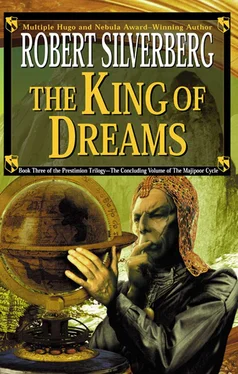They were camped on the northern bank of the Zimr, not far inland from Piliplok, in a pleasant, unspectacular countryside of rolling hills and well-tended farms. The air was warm here, a dry wind blowing from the south, and from the tawny look of the vegetation it was clear that in this district the rains of spring and early summer had long since ended. A host of small thriving cities lined both sides of the river in this district, and in each of them, so far, Dekkeret had been greeted with pleasure and excitement by the populace. Of whatever strange thing was going on in Ni-moya, the local officials seemed to have only the faintest idea, and they spoke of it to Dekkeret with obvious embarrassment and uneasiness. Ni-moya was thousands of miles away, in another province; Ni-moya, to these country people, was sophisticated to the point of decadence; if Ni-moya had decided to involve itself in some sort of peculiar political upheaval, that was a matter between Ni-moya and the Coronal, and no doubt the Coronal would very quickly take steps to restore the natural order of things there.
Septach Melayn said, “Read me the Sambailid lord’s demands again, will you, my lord?”
Dekkeret riffled through the elegantly lettered parchment sheets. “Mmmm… here it is. Not demands, exactly. Proposals. The Lord Gaviral—an interesting title; who ever made him lord of anything?—deplores the possibility that armed conflict might break out between the forces of the people of Zimroel and those of the Coronal Lord Dekkeret of Alhanroel—notice, I am Coronal of Alhanroel, here, not of Majipoor—and calls for peaceful negotiations to resolve the conflict between the legitimate aspirations of the people of Zimroel and the equally legitimate authority of the imperial government of Alhanroel.”
“At least he concedes that it’s a legitimate government,” said Septach Melayn. “Even if he does keep talking about it as Alhanroel’s government, and not Majipoor’s.”
“Be that as it may,” Dekkeret said, with a shrug. “He’s taking the approach that this is to be a discussion between powers of equal standing, and that, of course, we can’t allow. But let me go on: he wants—ah—here, yes—the primary thing that he wants to discuss at our meeting is the restoration of the title of Procurator of Zimroel, hereditary to his family. Hopes we can come to a peaceful agreement concerning the powers of said Procurator. Implies that his current title of Pontifex of Zimroel is merely provisional, and that he would be willing to abandon all claim to a separate Pontificate, in return for a constitutional compromise granting greater autonomy to Zimroel in general and the province of Ni-moya in particular, all of this under a Sambailid procuratorship.”
“Well, then,” Septach Melayn said, “is somewhat less fuss here than at first report. Sounds to me as though he’d be willing simply to settle for the name of Procurator and political control over Ni-moya and its surroundings. Which is more or less what Dantirya Sambail had.”
“A title which Prestimion stripped him of,” said Gialaurys. “And vowed there would never be Procurators in Zimroel again.” The Grand Admiral’s jowly face reddened, and growling sounds came from somewhere deep within him. He had the look, Dekkeret thought, of some great volcano preparing to erupt. “Are we to hand to the worthless nephew that which Prestimion took from the uncle, just on the nephew’s say-so? Dantirya Sambail, at least, was a great man in his way. This one’s a stupid pig and nothing more.”
“Dantirya Sambail a great man?” Dinitak said, startled. “From all I heard, he was a monster of monsters!”
“That too,” said Dekkeret. “But a shrewd and brilliant leader. He was no small instrument in the bringing of Zimroel into the modern world, in the days when Prankipin and Confalume ruled, and this continent was a patchwork of little principalities. He worked well with Castle and Labyrinth for forty years, until the time came when he took it into his head to be the one who named the new Coronal, and after that nothing was ever the same.” And, to Gialaurys: “You know better than to think that we’d actually be handing power to this Gaviral anyway, my lord Admiral. This letter’s Mandralisca’s work. Is Mandralisca who’d be the real Procurator, if ever we let the title come back into being.”
“And neverthless you intend to parley, my lord, knowing you are in fact parleying with the serpent Mandralisca, who has tried once already to take your life?” Gialaurys asked.
Septach Melayn stroked his little curling beard and laughed. “Do you remember, Gialaurys, when we were all of us drawn up at Thegomar Edge just before the final battle of the Korsibar war, and a herald under a white flag came out from Prince Gonivaul, who was Grand Admiral then, saying that Lord Korsibar still had hope of a peaceful resolution of all disputes and was calling for a parley?”
“Yes, and suggested that Duke Svor should be the one we send out to discuss terms with him?” said Gialaurys, grinning at the memory.
To Dinitak Septach Melayn said, “Svor was the least warlike of us all, and the trickiest. And had been a good friend of Korsibar’s before the factions divided. We saw no purpose in the parley, but Prestimion said, ‘It does no harm to listen,’ just as Dekkeret has said here today. And so Svor rode forth and met with Gonivaul in the middle of the open field, and Gonivaul made his proposal, which was that Svor wait until the battle had begun and at that time go among Prestimion’s captains to say that Lord Korsibar would make them all dukes and princes if they would abandon Prestimion in mid-struggle and defect to the usurper. And also he offered little Svor Korsibar’s own sister, the beautiful This-met, to be his wife, as the fee for his treason. That was Korsibar’s idea of a parley.”
“And what did Svor do?” Dekkeret asked.
“Rode back to our camp and told us what had been offered, and we all had a good laugh, and then the battle began. In which Svor died bravely, as it happened, fighting well on Prestimion’s behalf, though the sly little man had never been much known for his valor before that day.”
“And will we all have a good laugh also,” said Dinitak, “when we find out what Mandralisca’s idea of a parley is?”
“That do I hope,” said Dekkeret.
“So you are resolved to go through with this thing?” Gialaurys asked.
“Indeed I am,” Dekkeret said. “Where’s the herald from the Lord Gaviral? Tell him I accept the invitation. We will set out at once for the appointed place.”
* * *
The appointed place was three thousand miles up the Zimr near a town called Salvamot, where in the old days the Procurator Dantirya Sambail had maintained a country retreat, Mereminene Hall by name. The domain had remained in the family after the Procurator’s downfall, and was now, apparently, the property of the Sambailid who called himself the Lord Gavahaud.
“Which one is that?” Dekkeret asked Septach Melayn. “Their names all sound alike to me. Is he the big drunken one?”
“That is Gavinius, my lord. Gavahaud is the popinjay, the pompous paragon of style and taste, a veritable Castle Mount of vanity and foolish arrogance. I look forward to taking instruction from him in the niceties of fashion.”
Dekkeret chuckled. “We all have much to learn from these people, I think.”
“And they will learn a little from us, my lord,” said Gialaurys.
It was not a usual thing for seagoing vessels to engage in river travel, but there would not have been riverboats enough to carry all of Dekkeret’s force, and the Zimr was so deep and wide it could handle the larger ships of the Coronal’s maritime fleet without difficulty. The only problem had to do with the regular commercial shipping on the Zimr, which was unprepared to find such a host of huge ocean-craft taking up the preponderance of the channel. They scattered this way and that as the great phalanx of Lord Dekkeret’s armada moved northward.
Читать дальше












